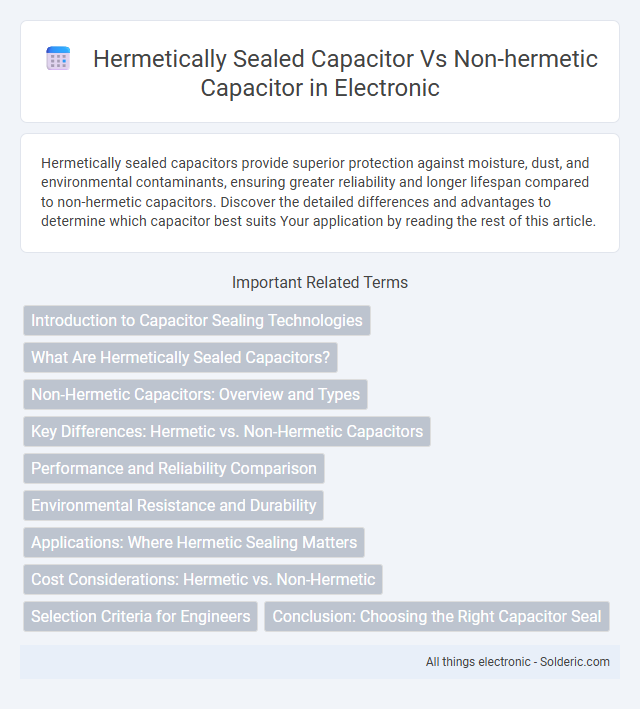Hermetically sealed capacitors provide superior protection against moisture, dust, and environmental contaminants, ensuring greater reliability and longer lifespan compared to non-hermetic capacitors. Discover the detailed differences and advantages to determine which capacitor best suits Your application by reading the rest of this article.
Comparison Table
| Feature | Hermetically Sealed Capacitor | Non-Hermetic Capacitor |
|---|---|---|
| Sealing | Air-tight, prevents moisture and contaminants | Not airtight, exposed to environment |
| Reliability | High reliability in harsh conditions | Lower reliability under extreme environments |
| Moisture Resistance | Excellent resistance to humidity and corrosion | Poor resistance, prone to corrosion |
| Application | Aerospace, military, medical, high-reliability electronics | General electronics, consumer devices, low-cost applications |
| Cost | Higher manufacturing and material cost | Lower cost, mass-produced |
| Lifespan | Longer lifespan due to protection | Shorter lifespan, affected by environmental factors |
Introduction to Capacitor Sealing Technologies
Hermetically sealed capacitors use airtight metal or ceramic enclosures to prevent moisture, contaminants, and gas ingress, ensuring enhanced reliability and longevity in harsh environments. Non-hermetic capacitors typically rely on polymer or resin coatings that offer limited protection against external elements, making them more susceptible to degradation over time. The choice between these sealing technologies directly impacts the capacitor's performance stability, especially in high-temperature, high-humidity, or aerospace applications.
What Are Hermetically Sealed Capacitors?
Hermetically sealed capacitors are electronic components enclosed in airtight, corrosion-resistant casings to protect internal elements from moisture, dust, and environmental contaminants, ensuring enhanced reliability and longevity. These capacitors typically use metal, ceramic, or glass enclosures with welded or soldered seals, preventing air and gas exchange that can degrade dielectric materials. Compared to non-hermetic capacitors, which may be housed in plastic or epoxy and are more susceptible to environmental damage, hermetically sealed capacitors are preferred in aerospace, military, and high-reliability industrial applications where stability and performance are critical.
Non-Hermetic Capacitors: Overview and Types
Non-hermetic capacitors lack airtight sealing, making them susceptible to environmental factors such as moisture, dust, and temperature variations that can degrade performance over time. Common types include ceramic, film, electrolytic, and tantalum capacitors, each suited for specific applications based on capacitance range, voltage rating, and tolerance requirements. These capacitors are frequently used in consumer electronics and general-purpose circuits where hermetic sealing is not critical for reliability.
Key Differences: Hermetic vs. Non-Hermetic Capacitors
Hermetically sealed capacitors feature airtight enclosures that protect internal components from moisture, contaminants, and environmental degradation, ensuring longer lifespan and reliable performance in harsh conditions. Non-hermetic capacitors lack this sealed barrier, making them more susceptible to damage from humidity, dust, and temperature fluctuations. The key difference lies in hermetic capacitors' enhanced durability and stability in critical applications such as aerospace, military, and medical devices compared to the generally lower-cost, less robust non-hermetic variants.
Performance and Reliability Comparison
Hermetically sealed capacitors offer superior performance and reliability by providing airtight protection against environmental factors such as moisture, dust, and corrosive gases, which significantly reduces the risk of dielectric breakdown and capacitance drift over time. Non-hermetic capacitors lack this airtight enclosure, making them more susceptible to contamination, thermal cycling damage, and accelerated aging under harsh conditions, often resulting in reduced lifespan and inconsistent performance. For applications requiring high precision, stability, and long-term durability, hermetically sealed capacitors are the preferred choice due to their enhanced protection and consistent electrical characteristics.
Environmental Resistance and Durability
Hermetically sealed capacitors offer superior environmental resistance by protecting internal components from moisture, dust, and corrosive elements, which significantly enhances their durability in harsh conditions. Non-hermetic capacitors, lacking this airtight enclosure, are more susceptible to degradation caused by environmental factors such as humidity and temperature fluctuations. Your choice of capacitor type directly impacts reliability and lifespan, especially in demanding industrial or aerospace applications where environmental resilience is critical.
Applications: Where Hermetic Sealing Matters
Hermetically sealed capacitors are essential in aerospace, military, and medical device applications where exposure to extreme humidity, temperature variations, and corrosive environments can compromise component reliability. Non-hermetic capacitors are suitable for consumer electronics and general-purpose use where environmental protection is less critical. Your choice depends on the required durability and operational conditions, with hermetic sealing ensuring longevity and performance in harsh or mission-critical settings.
Cost Considerations: Hermetic vs. Non-Hermetic
Hermetically sealed capacitors typically incur higher manufacturing and material costs due to their robust airtight enclosures designed to prevent moisture and contaminants from affecting performance. Non-hermetic capacitors are generally more cost-effective, offering reduced initial investment but potentially higher failure rates and maintenance expenses in harsh environments. Evaluating the total cost of ownership reveals that hermetic capacitors are preferable for critical applications demanding reliability despite their premium price.
Selection Criteria for Engineers
Engineers select hermetically sealed capacitors for applications demanding superior reliability and environmental protection, such as aerospace and military sectors, due to their airtight enclosure preventing moisture ingress and corrosion. Non-hermetic capacitors are preferred in cost-sensitive or less critical environments where moderate performance and easier manufacturability suffice. Key selection criteria include operational temperature range, lifespan under harsh conditions, dielectric stability, and resistance to contamination, which influence capacitor longevity and circuit integrity.
Conclusion: Choosing the Right Capacitor Seal
Hermetically sealed capacitors provide superior protection against moisture, gases, and contaminants, ensuring long-term reliability in harsh environments. Non-hermetic capacitors are more cost-effective and suitable for applications with less exposure to extreme conditions. Your selection should be based on the operating environment, required lifespan, and budget constraints to optimize performance and durability.
hermetically sealed capacitor vs non-hermetic capacitor Infographic

 solderic.com
solderic.com